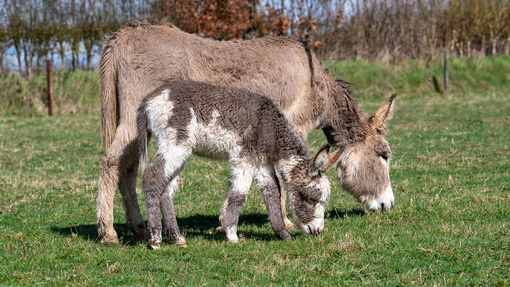Pregnant donkeys
- Once pregnancy is diagnosed a forage balancer such as Top Spec Donkey Forage Balancer should be added to the diet if not already fed, this will provide adequate vitamins, minerals and protein to the diet.
- In the last 3 months a more nutrient rich balancer such as Top Spec Comprehensive Balancer should be fed to ensure that the jenny’s vitamin, mineral, protein and micronutrient needs are being met.
- Increase the hay/haylage ration in the last 3 months to provide extra energy until feeding ad lib (free choice).
- If good quality hay/haylage is unavailable then supplementation with alfalfa based or other high fibre feeds is acceptable.
- Jennies in poor condition may benefit from the addition of unmolassed sugarbeet or alfalfa based feeds to the diet.
- A slight increase in body condition is acceptable to allow for normal, expected weight loss during lactation.
- Maintaining adequate energy intake is important to avoid the risk of developing hyperlipaemia.
Lactating donkeys
- Jennies should have access to good quality hay/haylage and pasture, with the addition of a forage balancer such as TopSpec Comprehensive.
- Alfalfa chops and high fibre cubes may be useful to promote weight gain or maintain weight if needed.
- Hyperlipaemia is a risk for lactating jennies if their energy needs are unmet.
Foals and youngstock
- Healthy foals will have all their nutritional needs met by their mother’s milk and forage/grazing up until weaning.
- It is important to monitor the foals weight gain every couple of weeks to avoid any rapid peaks or troughs in growth.
- If the growth rate is unsteady then the foal may need supplementary feeding, or restricting as appropriate.
- Foals should be allowed to pick at their mum’s feed as this is good preparation for weaning.
- Weaning usually takes place around 6 months of age onwards. Weaning can be approached a number of different ways including sudden withdrawal, group weaning or gradual weaning; the best option will depend upon your set up. Please contact us for advice.
- Weanlings (post weaning) should be fed ad lib straw alongside hay/haylage or grazing plus a balancer such as TopSpec Comprehensive to provide essential vitamins, minerals and protein for growth.
- Healthy youngsters should be fed a fibre based diet of ad lib straw alongside hay/haylage or grazing plus a balancer until approximately 2 years of age. The age of maturity varies between breeds and larger mammoth or poitou types may not mature until at least 3 years of age and they may require additional supplementary feeding for longer.
Things you should not do
- Jennies, foals and youngstock can be successfully fed for weight gain, maintenance or weight loss on fibre based feeds alone.
- There are no circumstances in which we would recommend cereal grain based feed (often branded as stud mixes or cubes) for any donkey due to the detrimental damage to health that can be caused by feeding cereal grains.
Possible diets
- Feeding straw should always be of good quality in terms of appearance, and free from dust and mould.
- Barley, oat or wheat straw can be fed to donkeys. Barley is a good all-rounder; wheat is lower in energy and coarser in texture and may be suitable for youngsters or those on a diet; oat is higher in energy and softer in texture and may be suitable for those needing to gain weight.
- High fibre, commercially produced haylage such as Horsehage’s High Fibre or Timothy are produced to a standard and will provide a consistent nutrient package as opposed to ‘farmer’s haylage’ which may be nutritionally unknown.
- High fibre nuts (Spiller’s High Fibre Nuts and Saracen’s Donkey Diet) provide an extra source of safe energy. Please note fibre nuts should always be fed soaked to donkeys.
- Speedi Beet (made by British Horse Feeds) as above.
- Fibre Beet (made by British Horse Feeds) – high calorie alfalfa-based product, excellent for promoting weight gain especially for heavily pregnant or lactating animals.
- Chaff to be used as a sole bucket feed or to mix with above e.g. Spiller’s Happy Hoof.
- TopChop Alfalfa - chaff to be used for weight gain.
- Feed Balancers – Top Spec Donkey Forage Balancer for ideal/overweight donkeys or jennies in early-mid pregnancy or Top Spec Comprehensive for late stage pregnancy, lactation, growing or underweight donkeys.
- Balancers and other feeds may be soaked when being introduced to prevent choke.
This is not an exhaustive list, please contact us if you require extra information about a product not listed above and it’s suitability for feeding to donkeys.
Download our factsheet with example diets for mature, pregnant and lactating donkeys.




